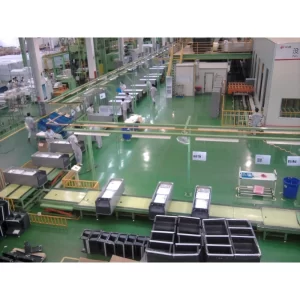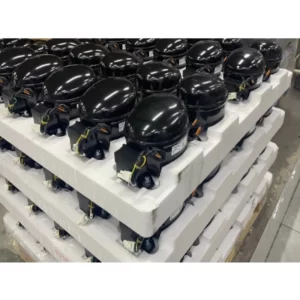In any commercial kitchen or foodservice business, a reliable refrigeration system is essential for keeping perishable items fresh and safe. At the core of this system is the commercial refrigerator compressor, a crucial component that ensures your refrigeration unit operates efficiently and maintains the desired temperature. Whether you're managing a restaurant, grocery store, or catering business, understanding the role, types, and maintenance of your commercial refrigerator compressor can save you time, money, and frustration.
What is a Commercial Refrigerator Compressor?
A commercial refrigerator compressor is the mechanical component responsible for circulating refrigerant throughout the refrigeration system, removing heat from the fridge's interior. By compressing refrigerant gas into a high-pressure, high-temperature liquid, the compressor helps keep the refrigerator cool and ensures food stays fresh. Without a properly functioning compressor, your refrigeration unit won’t work efficiently.
The compressor is the heart of any refrigeration cycle, making it one of the most important components in commercial refrigerators. It’s critical to understand its function to maintain proper cooling performance.
Types of Commercial Refrigerator Compressors
There are several types of commercial refrigerator compressors, each with distinct characteristics. Choosing the right type for your business can improve cooling efficiency, reduce energy consumption, and enhance longevity. Let’s explore the three most common compressor types:
1. Reciprocating Compressors
Reciprocating compressors are the most commonly used type in commercial refrigeration systems. These compressors use a piston to compress refrigerant gas and push it through the system. They are known for their durability and affordability, making them suitable for smaller to medium-sized refrigeration units. However, they can be noisy and are generally less energy-efficient compared to other types.
Advantages:
- Cost-effective
- Reliable for medium-sized refrigerators
Disadvantages:
- Noisier operation
- Lower energy efficiency
2. Scroll Compressors
Scroll compressors use two spiral-shaped scrolls to compress refrigerant gas, providing quieter and more energy-efficient operation than reciprocating compressors. These compressors are often used in larger commercial refrigeration systems, as they are better at handling larger cooling loads.
Advantages:
- Quieter operation
- Higher energy efficiency
Disadvantages:
- Higher upfront cost
- Less common for small refrigeration units
3. Rotary Compressors
Rotary compressors use a rotating piston within a cylinder to compress refrigerant gas. They are best suited for small to medium-sized units, offering compact design and quiet operation. However, their durability is typically not as high as reciprocating compressors, making them less ideal for long-term, heavy-duty use.
Advantages:
- Compact size
- Quiet operation
Disadvantages:
- Less durable than reciprocating compressors
- Only suitable for smaller units
How to Choose the Right Compressor for Your Commercial Refrigerator
Choosing the right commercial refrigerator compressor is crucial to ensure optimal performance. Consider the following factors when making your decision:
- Size and Capacity: Ensure the compressor is sized correctly for your refrigerator. An undersized compressor will struggle to cool the unit, while an oversized one wastes energy.
- Energy Efficiency: Opt for compressors with an Energy Star rating to reduce electricity costs. Energy-efficient models consume less power while maintaining excellent cooling performance.
- Refrigerator Type: The type of refrigerator you have (e.g., reach-in, walk-in, or display case) will determine the most suitable compressor type. Always follow the manufacturer’s recommendations.
Common Commercial Refrigerator Compressor Problems
Like any mechanical component, commercial refrigerator compressors can face issues that affect their performance. Being aware of common problems can help you address them early on and prevent more significant repairs.
- Overheating: A poorly maintained compressor may overheat, causing the refrigeration unit to stop cooling properly.
- Failure to Start: If the compressor doesn’t start, it could be caused by a faulty relay, capacitor, or other electrical issues.
- Strange Noises: Unusual sounds, such as buzzing or rattling, could indicate a mechanical problem or insufficient lubrication.
- Temperature Fluctuations: If the temperature inside your fridge fluctuates, it may be a sign that the compressor is struggling to maintain proper cooling.

Troubleshooting Tips for Commercial Refrigerator Compressors
If your commercial refrigerator compressor is malfunctioning, here are a few troubleshooting steps you can try:
- Check the power source: Ensure the unit is plugged in and the circuit breaker hasn’t tripped.
- Inspect condenser coils: Dirty or blocked coils restrict airflow, leading to overheating. Clean them regularly to improve cooling efficiency.
- Check the compressor relay and capacitor: A faulty relay or capacitor could prevent the compressor from starting properly.
- Listen for strange noises: Any abnormal sounds may indicate internal damage or wear.
If these steps don’t resolve the problem, it’s time to call a professional technician.
How to Maintain Your Commercial Refrigerator Compressor
Proper maintenance is essential for extending the lifespan of your commercial refrigerator compressor. Follow these tips to keep your system running smoothly:
- Clean the condenser coils: Dirty coils hinder the compressor's ability to cool the unit. Clean them every six months to ensure maximum efficiency.
- Monitor refrigerant levels: Low refrigerant levels strain the compressor. Have a technician check the refrigerant and top it up when necessary.
- Regular servicing: Schedule annual maintenance checks with a certified technician to keep everything running at peak performance.
Signs It’s Time to Replace Your Commercial Refrigerator Compressor
Over time, compressors wear out and may need to be replaced. Here are some signs that it’s time to replace your commercial refrigerator compressor:
- Inconsistent cooling: If the compressor can’t maintain the right temperature despite repairs, it may be time for a replacement.
- Increased energy consumption: A failing compressor uses more power to cool the unit, leading to higher energy bills.
- Frequent breakdowns: If the compressor is constantly malfunctioning, replacing it may be more cost-effective than continual repairs.
Cost of Commercial Refrigerator Compressor Replacement
The cost of commercial refrigerator compressor replacement depends on various factors, including the compressor type, unit size, and labor involved. Typically, the cost ranges from $500 to $1,500, with larger or more specialized compressors being more expensive. It’s essential to budget for replacement costs to avoid unexpected financial strain.
If you are looking for a high-quality commercial refrigerator compressor, please contact Link-machinery for detailed ordering information.
Conclusion
A well-maintained commercial refrigerator compressor is vital to the smooth operation of any foodservice business. Understanding the different types of compressors, how to troubleshoot common problems, and performing regular maintenance will ensure your refrigeration system stays efficient and reliable. When in doubt, consult a professional technician to address major issues. With the right care, your commercial refrigerator compressor will continue to perform at its best, keeping your food fresh and your business running smoothly.


